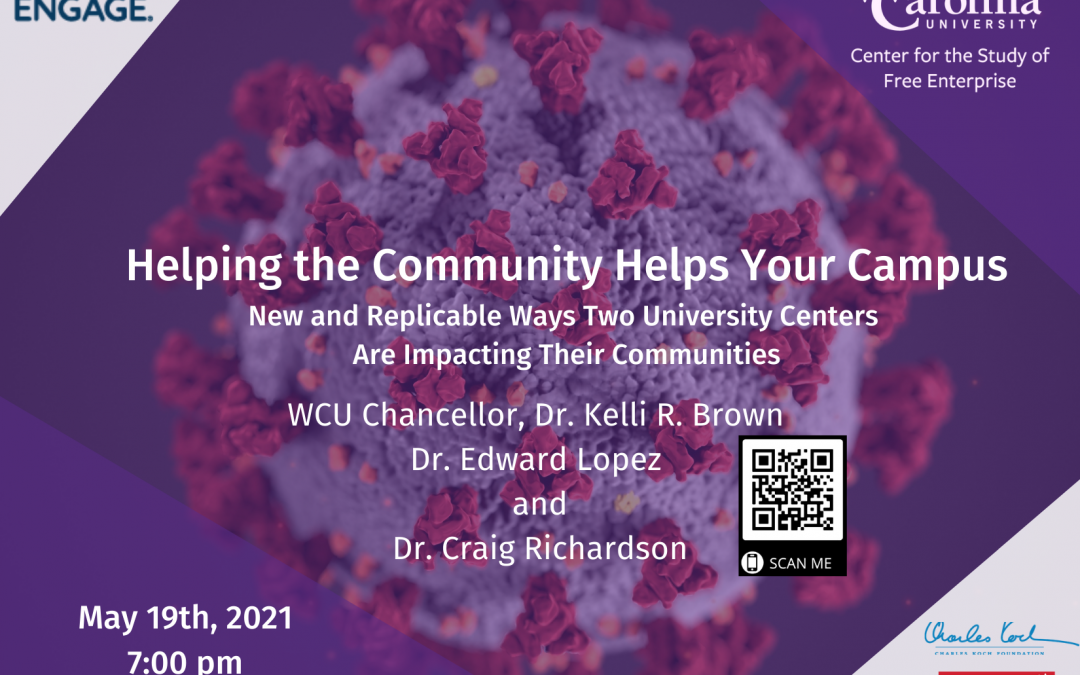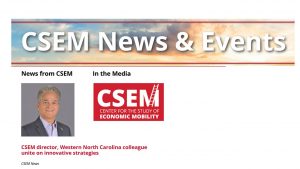As summer settles in, we invite you to check out the recap (below) and video of our May 19 event, “Helping the Community Helps Your Campus: New and Replicable Ways Two University Centers are Impacting Their Communities.” Craig Richardson and I are co-presenters. We cover the surprising ways geography creates economic and social division, and how our university centers have used research to identify and address problems. We discuss our “recipes” for bridging research and community. And we have a simple three-part takeaway: Equip, Connect, Transform.
Enjoy. And please drop us an email to let us know what you think.
CSEM director, Western North Carolina colleague unite on innovative strategies
By John Railey
CSEM Writer-in-Residence
Craig Richardson and Ed Lopez work in different areas of the state but are confronting similar challenges with innovative techniques. “We’re not in our silos,” CSEM Director Richardson said during a public discussion Wednesday night with Ed Lopez, the director of the Center for the Study of Economic Mobility at Western Carolina University in Cullowhee. “We’re actually going out in the community and seeing real change.”
Western Carolina hosted the event, which was livestreamed nationwide in partnership with the American Council on Education.
Richardson and Lopez both lead in research to help raise economic mobility. Both work in areas with big challenges. Lopez’s area is divided by rugged mountains that inhibit connectivity and economic growth. Winston-Salem is divided by U.S. 52, for generations the barrier between East Winston and prosperous areas to the west. Both men are using multidisciplinary approaches, inspiring student interns and sharing their centers’ groundbreaking research with community partners. Publishing in academic journals is important, Lopez said, but “it can be a transition point. It doesn’t have be the endpoint.”
Richardson and Lopez believe in putting their research to work in their communities. Wednesday night, they talked about their “recipes” for doing that, keeping the focus tight by concentrating on specific parts of their work. Richardson talked about CSEM’s work on transportation: solid research and a documentary, Bus Stop Jobs, which have been a major catalyst in encouraging The Winston-Salem Foundation to enact a grants program aimed at innovation in public transportation.
“You can move minds, but you have also have to move hearts,” Richardson said. “The recipe for impact was empirically grounded research and an emotionally connected film.”
Lopez talked about his center’s recipe for confronting the opioid crisis: a multi-disciplinary effort, using academics and experts from fields including criminal justice and social work. “We had a month-long public-awareness campaign, connecting emotionally on this important issue, telling the stories and allowing the research to connect,” he said. He uses a slogan to describe his center’s work in general: “Equip, connect and transform.”
Richardson and Lopez talk often, exchanging their “recipes.” Their centers are garnering national attention, setting models other colleges might use to confront the challenges beyond their walls.
Source: CSEM News & Events.


